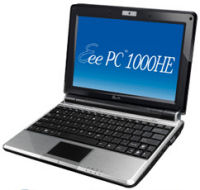The second theme from recent business announcements that suggest future directions for personal storage (see previous post) extends consumer storage from local disks to the network cloud.
Both of the netbooks that I looked at for my recent presentation on The Flash Storage Revolution (see previous post), are speced with "hybrid" storage -- combining both the built-in disk drive plus an additional allocation of online storage.
 For example, the ASUS Eee PC 1000HE comes with a 160 GB hard disk drive (HDD), plus 10 GB of online Eee storage, which is free for the first 18 months.
For example, the ASUS Eee PC 1000HE comes with a 160 GB hard disk drive (HDD), plus 10 GB of online Eee storage, which is free for the first 18 months.
And the Dell Inspiron Mini 9 ships with a relatively small 8 to 32 GB solid state drive (SSD), plus 2 GB of free online storage from Box.net. You then can upgrade to 25 GB for $100 a year, with relaxed limitations on uploads, folders, and transfer speed.
Meanwhile, LaCie also has reached to the clouds with its recent acquisition of Caleido AG, the creators of the Wuala social online storage service. You store and backup files in the cloud, and then access and share them from anywhere over the Web. LaCie sees this as morphing the company from a pure hardware manufacturer to a solution provider with a combined solution for storage -- Local storage on devices for fast access, plus secured remote storage on the cloud, for easy sharing and data versatility.
 Wuala really is a diffuse cloud -- It encrypts your shared files, splits them into fragments, and then stores them redundantly on servers and in its grid network. There's a desktop client for Windows, Mac, and Linux to drag-and-drop files to upload in the background, with fast download though parallel peer-to-peer connections.
Wuala really is a diffuse cloud -- It encrypts your shared files, splits them into fragments, and then stores them redundantly on servers and in its grid network. There's a desktop client for Windows, Mac, and Linux to drag-and-drop files to upload in the background, with fast download though parallel peer-to-peer connections.
Wuala starts with 1 GB of online storage, and can expand in two ways. You can trade your own idle disk space to become part of the cloud (i.e., 50 GB on your computer for 50 GB online), or buy additional storage (10 GB for $25 a year, 100 GB for $100, of 1 TB for $1000).
Online storage does solve a lot of problems for backup and sharing -- your files flow gently into the cloud where they can be easily accessed (with proper permission). Of course, there is an element of trust involved -- you're relying that the software is working correctly, the files are encrypted and protected safely, and the company managing the big farm of servers in the sky is not only reliable, but will still be around later when you really need those files.
Then Wuala's P2P storage mechanism adds another set of issues, both from the additional complexity of chopping up your files, and from the totally ad-hoc nature of where your files may happen to be stored. It's one thing to look for public files in the wilds of a P2P network, and another to store your own stuff out there, hoping that the redundancy algorithm can accommodate changes over time as consumer's computers with slices of your files go offline.
Still, anything that can get people backing up their files is a good start!
See my article on The Flash Storage Revolution for more on storage applications and developments.
See my Portable Storage Gallery for more on storage formats and devices.
See my Mobile Communications Gallery for more on netbooks.
![]() Find the
ASUS Eee PC 1000HE
Find the
ASUS Eee PC 1000HE
and Dell Inspiron Mini 9 on Amazon.com
